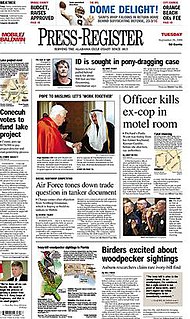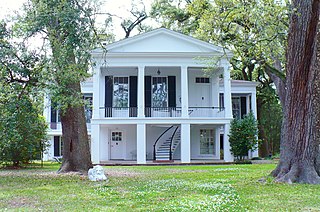
Mobile is the county seat of Mobile County, Alabama, United States. The population within the city limits was 195,111 as of the 2010 United States Census, making it the third-most-populous city in Alabama, and the most populous in Mobile County.

The Garden District is a neighborhood of the city of New Orleans, Louisiana, United States. A subdistrict of the Central City/Garden District Area, its boundaries as defined by the City Planning Commission are: St. Charles Avenue to the north, 1st Street to the east, Magazine Street to the south, and Toledano Street to the west. The National Historic Landmark district extends a little farther.

The Press-Register is a thrice-weekly newspaper serving the southwest Alabama counties of Mobile and Baldwin. The newspaper is a descendant of one founded in 1813, making the Press-Register Alabama's oldest newspaper. It is owned by Advance Publications, which also owns the primary newspapers in Birmingham, Alabama and Huntsville, Alabama. The Press-Register had a daily publication schedule since the inception of its predecessors in the early 1800s until September 30, 2012, at which time it and its sister papers reduced to print editions only on Wednesday, Fridays and Sundays. The Press Register also publishes an edition for the Mississippi Gulf Coast, The Mississippi Press.

The Times-Picayune | The New Orleans Advocate is an American newspaper published in New Orleans, Louisiana, since January 25, 1837. The current publication is the result of the 2019 acquisition of The Times-Picayune by the New Orleans edition of The Advocate, which began publication in 2013 as a response to The Times-Picayune switching from a daily publication schedule to a Wednesday/Friday/Sunday schedule in October 2012.

The New Orleans Cotton Exchange was established in New Orleans, Louisiana, in 1871 as a centralized forum for the trade of cotton. It operated in New Orleans until closing in 1964. Occupying several buildings over its history, its final location, the New Orleans Cotton Exchange Building, is now a National Historic Landmark.
The New York Cotton Exchange (NYCE) is a commodities exchange founded in 1870 by a group of one hundred cotton brokers and merchants in New York City. In 1998, the New York Board of Trade (NYBOT) became the parent company of the New York Cotton Exchange, and it is now owned by IntercontinentalExchange (ICE).

Regions Financial Corporation is a bank holding company headquartered in the Regions Center in Birmingham, Alabama. The company provides retail banking and commercial banking, trust, stockbrokerage, and mortgage services. Its banking subsidiary, Regions Bank, operates 1,952 automated teller machines and 1,454 branches in 16 states in the Southern United States and Midwestern United States.

Mobile, Alabama during the American Civil War was an important port city on the Gulf of Mexico for the Confederate States of America. Mobile fell to the Union Army late in the war following successful attacks on the defenses of Mobile Bay by the Union Navy.

The Mobile Yacht Club is a private boat club and harbor which first met as a group in 1847 before establishing a physical clubhouse in the 1850s. It is located in Mobile, Alabama.

Fort Charlotte, Mobile is a partially-reconstructed 18th-century fort in Mobile, Alabama.

Mobile was founded as the capital of colonial French Louisiana in 1702 and remained a part of New France for over 60 years. During 1720, when France warred with Spain, Mobile was on the battlefront, so the capital moved west to Biloxi. In 1763, Britain took control of the colony following their victory in the Seven Years War. During the American Revolutionary War, the Spanish captured Mobile and retained it by the terms of the Treaty of Paris in 1783.
USS Antona (1863) was a steamer captured by the Union Navy during the American Civil War. She was used by the Union Navy as a dispatch boat and gunboat in support of the Union Navy blockade of the Confederate States of America.

Oakleigh is a c. 1833 historic house museum in Mobile, Alabama, United States. It is the centerpiece of the Oakleigh Historic Complex, a grouping of buildings that contain a working-class raised cottage, Union Barracks, and a modern archives building. The name for the estate comes from a combination of the word oak and the Anglo-Saxon word lea, which means meadow. The complex is within the Oakleigh Garden Historic District, the surrounding district and neighborhood being named after the estate.

The Louise S. McGehee School is an all-girls private, independent school in the Garden District in New Orleans, Louisiana, United States. The McGehee campus, which is one city block, has ten buildings and at least 100,000 square feet (9,300 m2) of space.

1st Regiment Indiana Heavy Artillery was a heavy artillery regiment that served in the Union Army during the American Civil War. It was nicknamed the "Jackass Regiment". Before being converted into an artillery unit in 1863, it served as the 21st Regiment, Indiana Volunteer Infantry.

The Meridian race riot of 1871 was a race riot in Meridian, Mississippi in March 1871. It followed the arrest of freedmen accused of inciting riot in a downtown fire, and blacks' organizing for self-defense. Although the local Ku Klux Klan (KKK) chapter had attacked freedmen since the end of the Civil War, generally without punishment, the first local arrest under the 1870 act to suppress the Klan was of a freedman. This angered the black community. During the trial of black leaders, the presiding judge was shot in the courtroom, and a gunfight erupted that killed several people. In the ensuing mob violence, whites killed as many as 30 blacks over the next few days. Democrats drove the Republican mayor from office, and no person was charged or tried in the freedmen's deaths.
Mayer Lehman was a German-born American businessman, banker, and philanthropist. He was one of the three founding brothers of the investment bank Lehman Brothers.

James Freret (1838–1897) was an American architect who practiced in New Orleans, Louisiana, prolific in designing many homes in that area.
The following is a timeline of the history of the city of Mobile, Alabama, USA.

Edward McGehee was an American judge and major planter in Wilkinson County, Mississippi. He owned nearly 1,000 slaves to work his thousands of acres of cotton land at his Bowling Green Plantation.
















